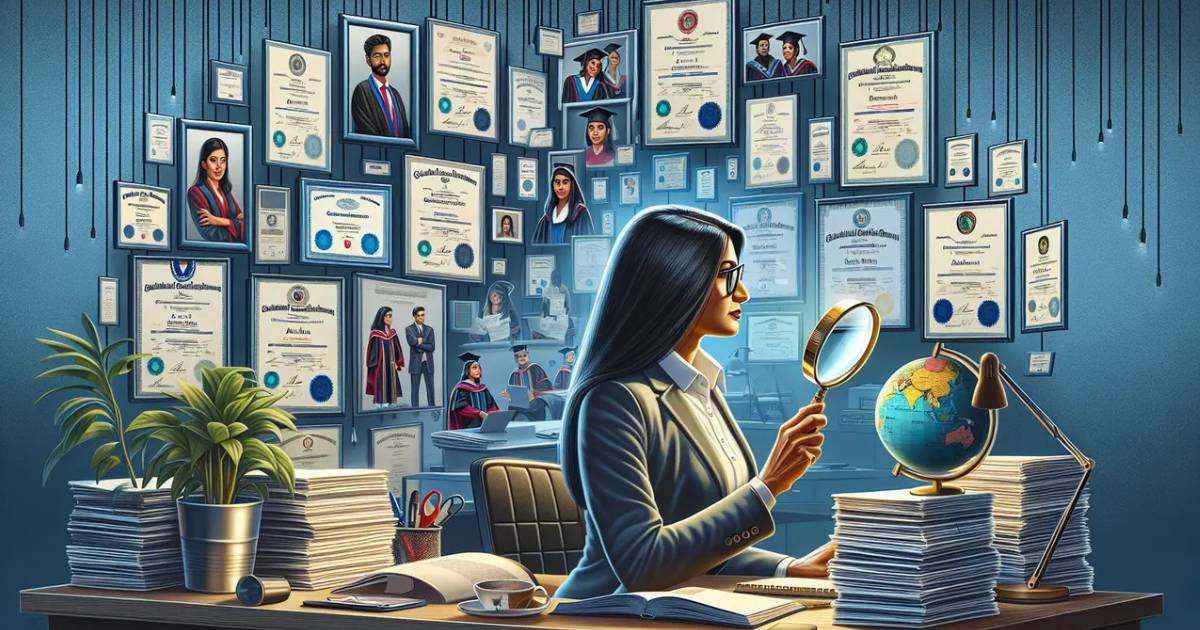Introduction to Educational Credential Evaluation
Educational Credential Evaluation (ECE) is a process that compares academic and professional degrees earned in one country to those earned in another. Ever wondered how a bachelor’s degree from India stacks up against one from the US? Or if your professional certificate holds the same weight abroad? That’s where ECE comes in. It’s not just about the comparison. It’s about making your qualifications recognized and valued, no matter where you go in the world. Universities, employers, and immigration authorities often require an ECE to understand the education level of international candidates. This process ensures that everyone speaks the same language when it comes to education standards. So, whether you’re planning to study further, chase your dream job overseas, or move to another country, getting your credentials evaluated is a vital first step. It’s the key that can unlock doors to global opportunities. Remember, in the world of academic and professional success, your credentials are your ticket. Make sure they get the recognition they deserve.
Need help with the ECE Certificate? Contact Us Now!
Understanding How Educational Credential Evaluation Works
An educational credential evaluation is a process where your foreign educational degrees and certificates are compared to those in another country, to understand their equivalent. Think of it as translating your academic achievements into a language that schools or workplaces abroad can understand and respect. It’s not about changing your qualifications but showcasing their value in a way that fits the new context.
Here’s how it usually works: You select an evaluation service, provide them with all your academic documents, and they analyze these against the standards of the country you are aiming to study or work in. The service will look at not just what you studied, but how the courses you took match up to local courses, how your institution ranks, and even how long you studied.
It’s like saying, if you were a top student at a well-regarded university at home, what would that mean if you were a student or job seeker here? This evaluation can help schools decide if they should admit you or help an employer decide if your degree is the right fit for the job they are offering.
In essence, educational credential evaluation bridges gaps and builds understanding, ensuring your hard-won achievements are recognized and valued, no matter where you go.
Read more: Comparing Educational Systems: Understanding Credential Evaluations
Why Educational Credential Evaluation is Crucial for Academic Success
Educational Credential Evaluation (ECE) plays a key role in academic success, especially for students studying abroad or those who’ve completed their education in a different country than where they’re seeking further education or employment. Think of ECE as a bridge that connects your studies from one country to the relevant standards of another, making sure the education you received holds weight everywhere. Without ECE, universities might not recognize your previous education, putting a halt on your academic journey. Simply put, it:
- Enhances your university application: Having your credentials evaluated can make you stand out, showing universities you are ready and serious about your academic future.
- Ensures you meet admission requirements: Different countries have different grading systems. ECE converts your grades so they make sense in another educational system, ensuring you meet the criteria.
- Saves you time and money: By understanding exactly what your previous education equates to, you can avoid repeating courses or enrolling in unnecessary ones, propelling you directly towards your academic goals.
ECE isn’t just a formal step; it’s your academic passport, making sure your hard-earned education is recognized and valued, wherever your academic or professional path takes you.
The Role of Educational Credential Evaluation in Professional Advancement
Understanding the value of your education in new territories is crucial when seeking global career opportunities. Educational Credential Evaluation (ECE) opens doors worldwide, ensuring your qualifications are recognized and respected. Essentially, it acts as a bridge, helping employers and educational institutions understand the weight of your academic achievements. Without ECE, it’s almost like speaking a different language – your potential might not be fully recognized. This process evaluates your degrees, diplomas, and certificates, benchmarking them against global standards. This means, whether you’re aiming for a job overseas or further studies, ECE ensures your hard-earned credentials are not lost in translation. In essence, it’s not just about showing you’re qualified; it’s about proving your qualifications hold power, enabling you to stand shoulder to shoulder with peers on a global stage. So, if you’re eyeing that international role or high-tier educational program, consider ECE your passport to success.
Common Types of Educational Credential Evaluations
When you’re looking to study or work in a different country, getting your educational qualifications evaluated is crucial. This process is known as educational credential evaluation. There are mainly two types of evaluations you’ll come across: comparative education evaluation and course-by-course evaluation.
Comparative education evaluation gives you a big-picture comparison. Think of it as an overview, telling institutions or employers how your education stacks up against their country’s standard. It’s like saying, ‘Hey, my degree is kind of like the degree you’re familiar with here.’
Then there’s the course-by-course evaluation. This one goes deep. It breaks down every subject you’ve studied, comparing it to their system. It’s for those who need to show the details – the nitty-gritty of what you’ve learned. It’s like saying, ‘Look, not only is my degree reputable, but here’s exactly what I’ve studied to prove I have the knowledge you need.’
Choosing between the two depends on your goal. If you’re applying for further education, you might need a course-by-course evaluation. For a job? A comparative education evaluation might suffice. But always check what the institution or employer requires. Sometimes they want specific details, sometimes they just need to know you’re qualified.
The Process of Obtaining an Educational Credential Evaluation
First, choose a reputable evaluation agency. There are many out there, but you want one recognized by academic institutions or employers. Next, gather all necessary documents. This usually includes transcripts, diplomas, and sometimes course descriptions. You’ll need to send these to the evaluation agency, often with an English translation if they’re in another language. The agency then reviews your documents, comparing your education to the U.S. or other system standards. This process can take a few weeks. Finally, you receive a report detailing how your education matches up. This report can open doors for further study or job opportunities, making it a crucial step for those who’ve studied abroad.
How Educational Credential Evaluation Benefits International Students and Professionals
Educational Credential Evaluation (ECE) is like a bridge for international students and professionals aiming to study or work in another country. It’s the process that checks if your degree, diploma, or certificate matches the standards of the new country you’re eyeing. Here’s how it paves the way for success abroad. First off, ECE helps in university admissions. Schools want to know you’re on par with their standards. Without ECE, your application might not even get a second glance. Next, it’s crucial for job hunting. Employers look for qualifications they understand and trust. ECE assures them your education back home lines up with what they expect. Also, it’s about getting the respect you deserve. Your hard work should count, no matter where you earned your degrees. ECE makes sure it does. In short, whether it’s continuing your education or climbing the career ladder, ECE swings doors wide open internationally. Don’t skip it.
Read more: How World Document Services Streamlines Your Credential Evaluations
Challenges and Solutions in Educational Credential Evaluation
When you decide to study or work in a different country, one big step you’ll face is getting your educational credentials evaluated. This process often sounds more straightforward than it is. Let’s break down the main challenges and point out some solutions.
First off, not every institution or country recognizes or understands foreign credentials equally. This can block your entry into universities or job markets. The solution? Research and use reputable credential evaluation services that have a history of being recognized by institutions in your target country.
Next, the process can get expensive. You’re likely to need translations and various document services on top of evaluation fees. To manage costs, compare service providers carefully. Some offer package deals or more economical options for digital versus physical document handling.
Timing is another hurdle. These evaluations can take a while, from a few weeks to several months. Planning is key here. Start the process well in advance of application deadlines or job start dates to avoid stressful last-minute rushes.
Lastly, understanding the details of the evaluation report can be tricky. It’s not just about whether your degree is equivalent, but also how your grades translate or if your qualifications meet specific professional standards. Consulting with academic advisors or career counselors in your target country can help translate this information into actionable steps.
In essence, while the road to getting your educational credentials evaluated may seem dotted with obstacles, a mix of thorough research, early planning, and strategic consultations can smooth your path significantly.
Success Stories: Real-life Impact of Educational Credential Evaluation
Educational Credential Evaluation (ECE) has changed lives. Take Ana’s story—moving from Colombia, her engineering degree wasn’t recognized in Canada. Through ECE, her credentials were assessed, showing she met the Canadian engineering standards. Now, Ana leads projects in a top engineering firm. Then there’s Sam, who dreamed of studying in the U.S. His courses from India seemed incompatible with U.S. colleges. After his ECE, colleges recognized his hard work, and he’s now pursuing a master’s degree on a full scholarship. Stories like Ana’s and Sam’s highlight that credential evaluation can open doors—professionally and academically. It’s about getting your skills and knowledge rightfully acknowledged, no matter where you come from.
Conclusion: Maximizing Your Potential with Educational Credential Evaluation
In wrapping up, remember that getting your educational credentials evaluated is a smart move. It’s like having a key to doors that were once closed. Whether it’s for academic pursuits, career advancement, or even immigration purposes, an evaluation can significantly boost your chances of success. It tells institutions and employers that what you’ve learned matches up with their standards. So, don’t see it as an extra step but as a strategic advantage. Investing in a credential evaluation could very well be the best decision for your future, setting you apart in a competitive world. Keep it simple, take the step, and maximize your potential.
















 Call Us
Call Us Mail Us
Mail Us WhatsApp
WhatsApp
